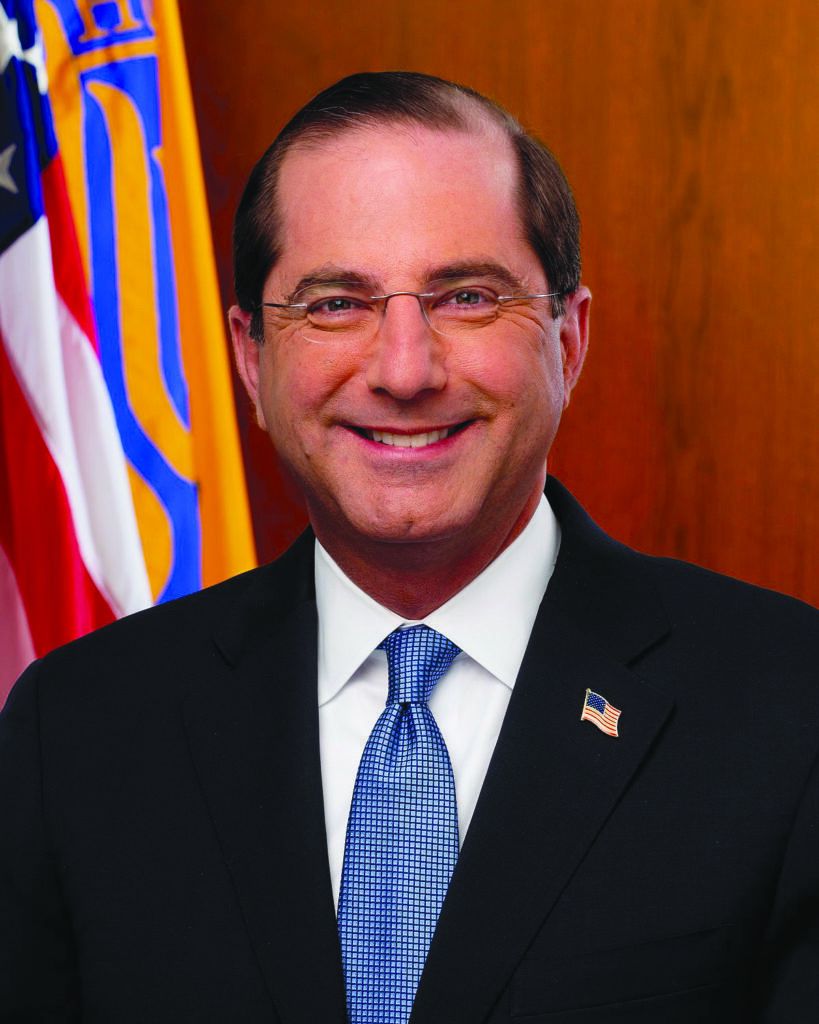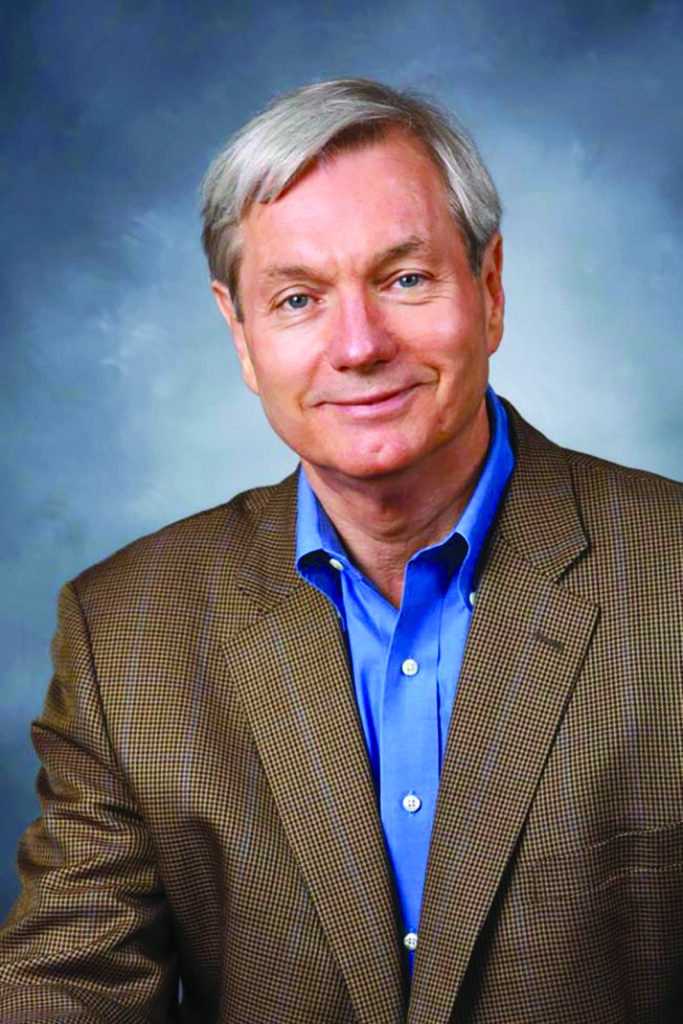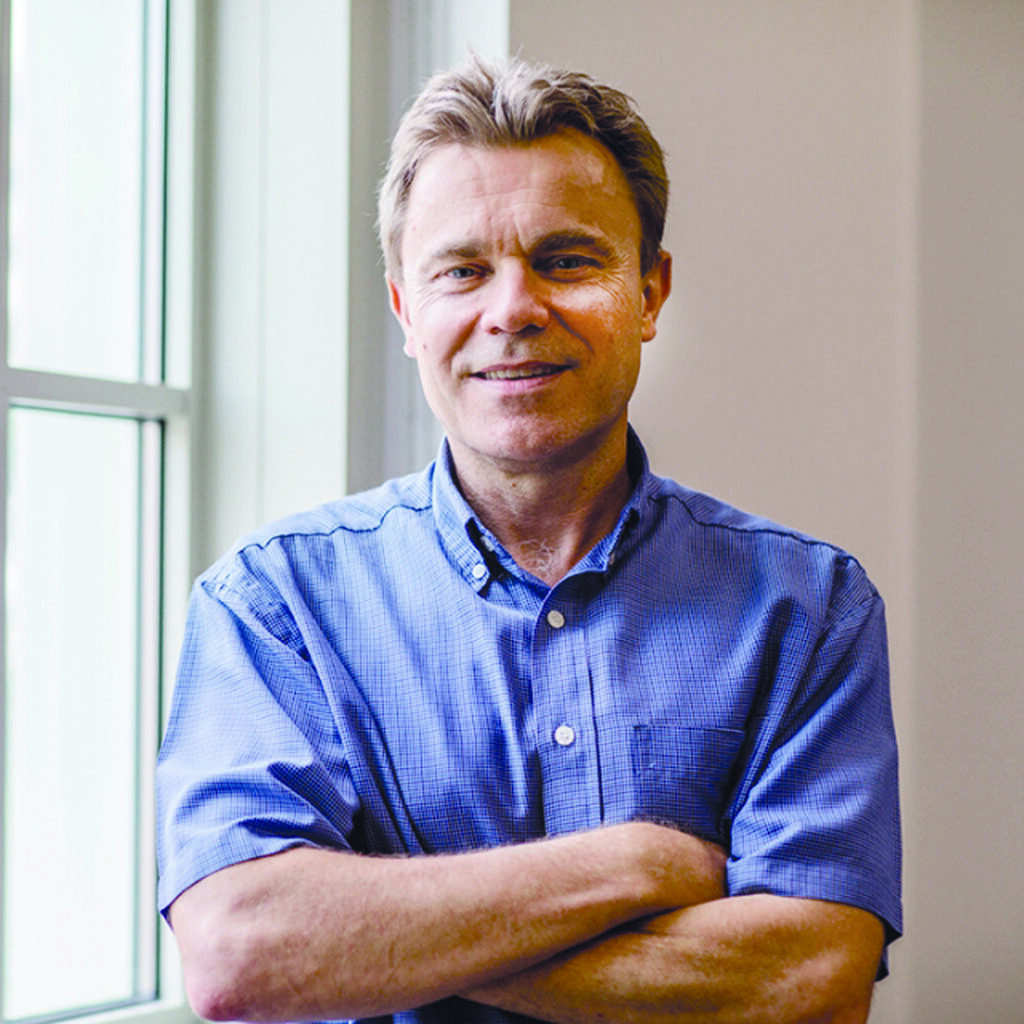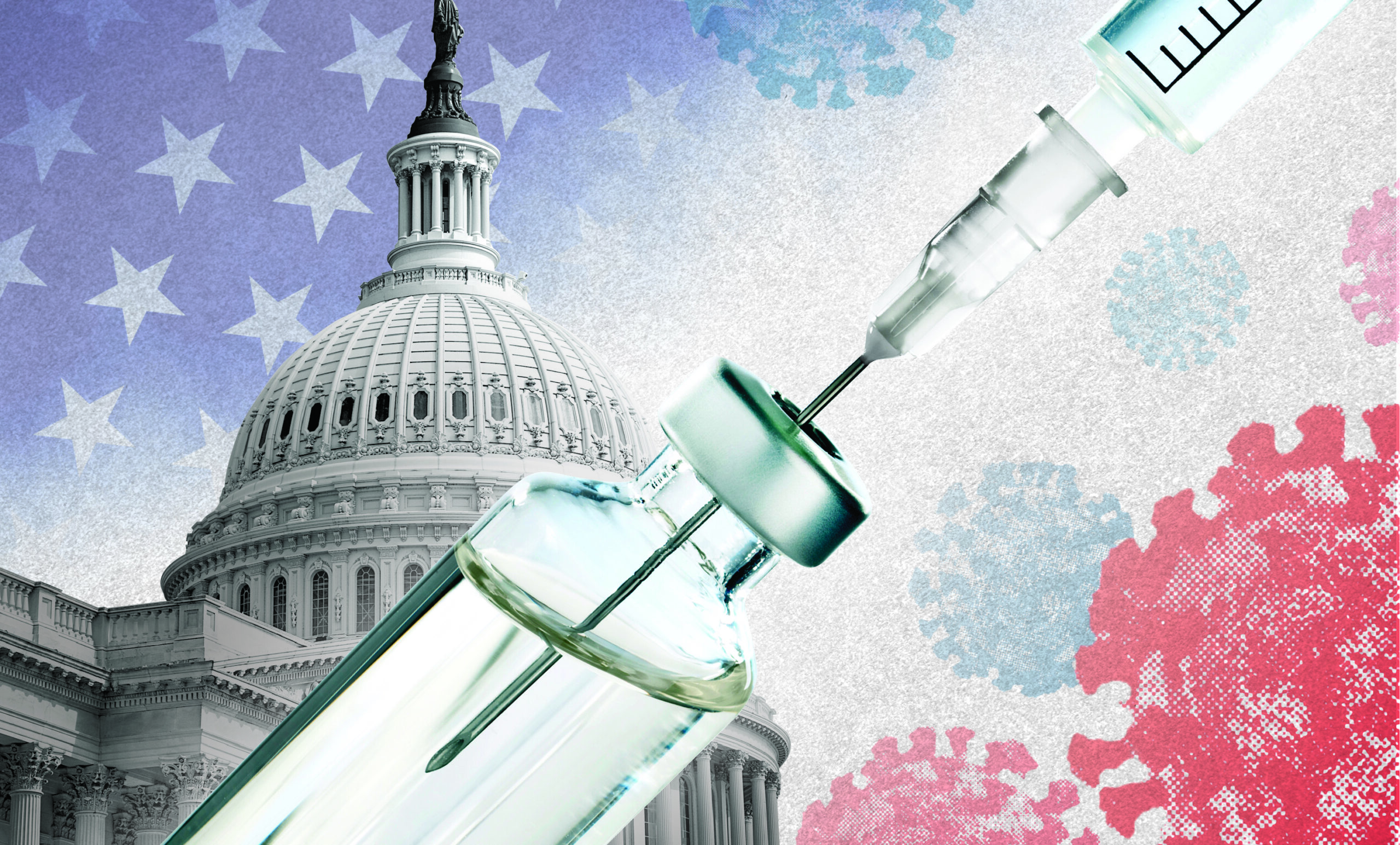In the run up to the US presidential election, there was criticism that the race to develop a Covid-19 vaccine had been politicised. Bette Browne reports on the debates around vaccine development and the need to address the increasing problem of vaccine hesitancy
America’s missteps in handling Covid-19 have contributed to the soaring number of deaths from the pandemic but now the country may be heading into another nightmare, as medical experts warn that “politicisation” of the search for a vaccine could imperil delivery of an eventual immunisation programme. A poll by the Kaiser Family Foundation found 54 per cent would not take a vaccine if it emerged in the coming months. A Harris poll on 20 October found that while 58 per cent said they would get vaccinated as soon as a vaccine was available, this was down from 69 per cent who said so in August. These figures suggest the regulatory approval process for a vaccine has already been highly politicised in the mind of Americans. Ironically, what began as an effort by US outgoing President Donald Trump to have a vaccine before the presidential election could now have the effect of slowing acceptance of one. The heat of the election might be over but its consequences will continue to impact the next stage of the battle against the pandemic, even though officials at the Food and Drug Administration (FDA) and vaccine manufacturers have pledged not to release any vaccine unless it has proven to be safe and effective. There is also concern that during the two months until the presidential inauguration on 20 January 2021, President Trump may wish to see a vaccine as part of his legacy and may continue to pile pressure on scientists, vaccine manufacturers and government officials overseeing the regulatory process.
Vaccines are typically approved by the FDA and if the White House were to overrule the FDA’s scientific judgment, a vaccine of limited efficacy or unknown side effects could potentially be rushed out to the market by the President. Fears were not allayed before the election when the Secretary of Health and Human Services (HHS) Alex Azar asserted his agency’s rule-making authority over the FDA. It was described in blunt terms by The New York Times as a “power grab”. A 15 September memo obtained by the newspaper said Azar “barred the nation’s health agencies, including the FDA, from signing any new rules regarding the nation’s foods, medicines, medical devices and other products, including vaccines”. Going forward, the newspaper reported, “Mr Azar said such power is reserved to the Secretary.”

Emergency use authorisation
In essence, it gave Mr Azar, who reports directly to President Trump, the authority to issue an emergency use authorisation (EUA) before any vaccines have been shown to be safe and effective in late-stage clinical trials. The 2004 law allows the FDA to issue an EUA with much less evidence as long as the vaccine “may be effective” and its “known and potential benefits” outweigh its “known and potential risks”. The EUA law was essentially introduced in the context of dealing with a declared emergency involving a heightened risk of attack on the public or US military forces. The US National Centre for Biotechnology Information describes the EUA as follows: “EUA permits the FDA Commissioner to authorise the use of an unapproved medical product or an unapproved use of an approved medical product during a declared emergency involving a heightened risk of attack on the public or US military forces, or a significant potential to affect national security. “EUA is an important tool for public health officials and physicians involved in an emergency response because it can enable them to use the best countermeasure available to detect, prevent, or treat a disease or injury in certain populations, even if that countermeasure is unapproved by the FDA or not approved for that particular use.” The idea that the HHS Secretary would approve or authorise a vaccine over the FDA’s objections has been dismissed by both the HHS and the White House. “This is preposterous and betrays ignorance of the transparent process that we’re following for the development of the vaccines,” said HHS Chief of Staff Brian Harrison. White House spokesperson Judd Deere also dismissed the concerns, saying President Trump cared only about the public’s safety and health. “This false narrative that the media and Democrats have created that politics is influencing approvals is not only false but is a danger to the American public.”
I think there would be an outcry from the public health community second to none, which is my worst nightmare – my worst nightmare – because we will so confuse the public
But Prof Jerry Avorn, a Professor of Medicine at Harvard Medical School, writing in the New England Journal of Medicine, said it was “certainly possible legally and politically” while other medical observers said such a move could seriously threaten public confidence in a Covid-19 vaccine and even put scientific and medical authorities in the position of urging people not to be vaccinated. Physicians might refuse to administer a vaccine approved with inadequate data, Prof Preeti Malani, Chief Health Officer and Professor of Medicine at the University of Michigan, said in a webinar. “You could have a safe, effective vaccine that no one wants.” It is also worth noting that the FDA has already faced criticism for issuing emergency authorisations for two Covid-19 treatments promoted by President Trump, but which lacked strong evidence—hydroxychloroquine and convalescent plasma. “I think there would be an outcry from the public health community second to none, which is my worst nightmare – my worst nightmare – because we will so confuse the public,” Dr Michael Osterholm, Director of the Center for Infectious Disease Research and Policy at the University of Minnesota, said in a podcast. Still, “even if a company did not want it to be done, even if the FDA did not want it to be done, he (Trump) could still do that,” said Dr Osterholm in his podcast. “I hope that we’d never see that happen, but we have to entertain that’s a possibility.”

In early October, however, the FDA published a document on its website updating safety standards for vaccine makers. A month earlier, nine pharmaceutical companies issued a joint statement pledging they would “stand with science” and not put forward a vaccine until it had been thoroughly vetted for safety and efficacy. While they did not rule out seeking an emergency authorisation, they promised that any potential vaccine would be based on “large, high quality clinical trials” and they would follow guidance from regulatory agencies like the FDA. “We believe this pledge will help ensure public confidence in the rigorous scientific and regulatory process by which Covid-19 vaccines are evaluated and may ultimately be approved,” the companies said. The pledge should help to boost the confidence of the general public when a vaccine emerges but another obstacle may be opposition from the growing anti-vaccination movement, along with conspiracy theorists. Among the more bizarre false notions is that Microsoft co-founder Bill Gates is creating a tracking device to be implanted in a Covid-19 vaccine to monitor people’s movements.
Indeed, misinformation about Gates is now the most widespread of all coronavirus falsehoods tracked by the media analytics company Zignal Labs. So called “anti-vaxxers” make up a small percentage of the US population, but amid the coronavirus crisis they have become increasingly vocal. One of their leading voices is Robert F Kennedy, son of US Senator Robert Kennedy and nephew of President John F Kennedy. He has been a prominent figure in the anti-vaccination campaign for a number of years. His stance has been publicly condemned by the rest of the Kennedy family, who have accused him of helping “to spread dangerous misinformation over social media” and being “complicit in sowing distrust of the science behind vaccines”. Mr Kennedy, who chairs the “Children’s Health Defense”, an organisation that is sceptical about the benefits of vaccines, insists he is not anti-vaccine. “I want safe vaccines with robust safety testing,” he said.
Vaccine hesitancy
In 2019, the World Health Organisation named vaccine hesitancy as one of the top 10 threats to global health. Vaccine hesitancy “threatens to reverse progress made in tackling vaccine-preventable diseases.” The Organisation added that vaccination is “one of the most cost-effective ways of avoiding disease”, noting it prevents two to three million deaths a year worldwide. It said some 1.5 million more deaths could be avoided if the rate of vaccinations increased around the world. The scientific evidence for the effectiveness of large-scale vaccination campaigns is well established. Vaccination campaigns helped eradicate smallpox, which once killed as many as one in seven children in Europe, and have nearly eradicated polio. Infections caused by Haemophilus influenza (Hib) have decreased by over 99 per cent in the US since the introduction of a vaccine in 1988. It is estimated that full vaccination, from birth to adolescence, of all US children born in a given year would save 33,000 lives and prevent 14 million infections. Immunisation gaps exist for a number of reasons. Researchers in the US have identified “hot spots” in a number of major cities of unvaccinated school-age children, where parents refuse the required vaccines for their children on religious or philosophical grounds. Other reasons include poor access to the vaccines or inconvenience, and a lack of confidence in their effectiveness.
A 2018 survey found Americans’ trust in vaccinations was declining. The heightened mistrust, researchers said, was especially prevalent in small pockets of people in insular communities or like-minded communities online. Still, the number of Americans who say that other children are put at risk if a child isn’t vaccinated remains high – 81 per cent. The percentage of people who agree that, when parents decide not to vaccinate, it puts the children and communities at risk has risen 10 points to 61 per cent over the past decade. “Covid-19 will die out before the anti-vaccination movement,” says Prof Barry Bloom, Research Professor of Public Health at the Harvard TH Chan School of Public Health. Rather than being cowed, the movement has been invigorated by the pandemic, he told the BMJ.
‘Growth opportunity’
Covid has been a growth opportunity for the anti-vaccination movement, according to the London-based Centre for Countering Digital Hate. The Centre stated: “Our investigation of 409 English language anti-vaxx social media accounts shows that they now have 58 million followers. For 147 of the largest accounts, with 49 million followers, we have calculated that they have gained at least 7.8 million followers since 2019, an increase of 19 per cent.” Prof Neil Johnson (PhD), a Professor of Physics at George Washington University, published a paper in Nature earlier this year concluding that the anti-vaccination movement was winning the online information war because it was organised around smaller “clusters” that were able to infiltrate groups of undecided people. “Since 2019, the (anti-vaccination) communities have grown enormously and it’s almost like the whole thing is in some sort of overdrive, it’s kind of on steroids,” Prof Johnson said. “It’s the parenting groups, the school parents’ associations – people who would never usually talk about vaccines, but now they are absolutely engaged.” Distrust in scientific expertise is dangerous, Prof Johnson emphasised. “Opposition to vaccination with a future vaccine (against Covid-19), for example, could amplify outbreaks as happened for measles in 2019. Homemade remedies and falsehoods are being shared widely on the Internet, as well as dismissals of expert advice.”

He described a “multi-sided landscape of unprecedented intricacy that involves nearly 100 million individuals partitioned into highly dynamic, interconnected clusters across cities, countries, continents, and languages. “Although smaller in overall size, anti-vaccination clusters manage to become highly entangled with undecided clusters in the main online network, whereas pro-vaccination clusters are more peripheral. Our theoretical framework reproduces the recent explosive growth in anti-vaccination views, and predicts that these views will dominate in a decade.” In addition to dealing with potential hesitancy about a vaccine when it emerges, the United States, like many other countries, will face major logistical problems with distribution.
In the United States there won’t be enough vaccine in the immediate term for all 330 million Americans, so decisions will have to be made on what section of the community will get it first. US health officials and lawmakers are concerned that vaccine distribution could face the same sort of disruptions that led to chronic shortages of coronavirus diagnostic tests and other medical supplies. States will need to know promptly if the federal government will pay for the vaccines, as it did during the H1N1 outbreak in 2009. The Centres for Disease Control and Prevention (CDC) released a plan in September to make vaccines for Covid-19 available for free to all Americans. The agency said it anticipates a coronavirus vaccine will initially be granted an emergency use authorisation before a full formal approval. Much of the guidance, but not all, described in the plan will overlap with many routine activities for immunisations and pandemic influenza planning, CDC Director Dr Robert Redfield said. When larger quantities of vaccine become available, the CDC said, there will be two simultaneous objectives – to provide widespread access to vaccination and to ensure high uptake in target populations, particularly those at high risk of death or complications from Covid-19. Dr Redfield told a US Senate hearing that his agency would spearhead the campaign to develop and distribute a vaccine for the coronavirus.
Since 2019, the (anti-vaccination) communities have grown enormously and it’s almost like the whole thing is in some sort of overdrive, it’s kind of on steroids
“This is really the prime responsibility of CDC,” he said. Nevertheless, the FDA and the CDC, as well as HHS, have been perceived as not forcefully fending off political interference on the issue. Public health experts at the CDC who led the country’s responses to countless threats over decades, including against HIV, the anthrax attacks in 2001, SARS, the H1N1 flu pandemic and Ebola, were essentially sidelined by the Trump administration during the election campaign. CDC advice to slow testing sparked an extraordinary op-ed in The New York Times in August urging public health officials around the country to “ignore the CDC”. It was written by Mr Harold Varmus, a former director of the National Institutes of Health, and Mr Rajiv Shah, President of the philanthropic Rockefeller Foundation. “The CDC, the federal agency that should be crushing the pandemic, is promoting policies that prolong it,” they wrote. “State and local leaders should be emboldened to act independently of the federal government and do more testing. Some governors and local public health officials, from both parties, are already doing so and are ignoring the CDC’s revisions. This position is legally sound, since the CDC is an advisory agency, not a regulatory one. Still, such discord undermines confidence in public health directives.”
On the positive side, however, two new surveys show most Americans still generally trust leading scientists and institutions like the CDC, although those levels of trust are beginning to erode. Nearly eight-in-10 Americans trust the CDC, according to a survey in September by the Covid- 9 Consortium for Understanding the Public’s Policy Preferences Across States, a group of researchers at Northeastern University, Harvard, Rutgers, and Northwestern University. That figure is down from 87 per cent who said they trusted the CDC back in April. A poll by the Kaiser Family Foundation found 67 per cent of Americans have a great deal or a fair amount of trust in the CDC to provide reliable information about the coronavirus, although that number had dropped 16 percentage points since April. Dr Anthony Fauci, the country’s top infectious diseases expert, is still viewed as the most trusted individual to deliver information about the virus, according to both surveys.
Election issue
At the height of the presidential election, Democrat Joe Biden, who is now President-elect, thrust the issue of a coronavirus vaccine centre stage, expressing grave concern over the political pressure he said President Trump was exerting over the government’s approval process and accusing him of trying to rush out a vaccine for electoral gain. “Scientific breakthroughs don’t care about calendars any more than the virus does,” he said. “They certainly don’t adhere to election cycles. And their timing and their approval and their distribution should never, ever be distorted by political considerations. It should be determined by science and safety alone.” But scientific views on the virus have rarely seemed uppermost in President Trump’s mind or pronouncements. Even after he contracted the virus in the weeks before the election, he went so far as to say on 11 October that he was immune, without offering any proof or elaboration. One day later, his son Eric repeatedly claimed his father’s recovery from coronavirus was a result of “vaccines” President Trump created. “It was amazing,”
Eric Trump told the ABC network. “It actually probably goes to speak to how good some of these vaccines that are being created are and what my father’s done on the vaccine front, no one could have done. My father, literally, started day one creating this vaccine. He worked to push this vaccine. And now my father just took it. And you see how well he got over it.” The President, of course, did not receive a vaccine for the simple reason that none yet exists. What he did receive were several therapeutics designed to help him deal with the virus. Those included the anti-viral drug remdesivir, the steroid dexamethasone and an experimental antibody cocktail produced by the pharmaceutical company Regeneron. The downplaying by the Trumps of the brutal disease alarmed health experts. “We’re all glad that the President of the United States did not suffer any significant consequences of it,” Dr Fauci said. “But… because he is such a visible figure, it amplifies some of that misunderstanding that people have that it’s a benign disease and nobody has anything to worry about.” In response, President Trump rounded on Dr Fauci. On October 20, he called scientists and experts like Dr Fauci “idiots” who focused excessively on the disease. In a move unprecedented in its 208-year history, nearly three dozen editors joined in signing an editorial in the New England Journal of Medicine castigating the US government’s politicisation of its response to the Covid-19 crisis.
“The government has appropriately invested heavily in vaccine development, but its rhetoric has politicised the development process and led to growing public distrust. “The Centres for Disease Control and Prevention, which was the world’s leading disease response organisation, has been eviscerated and has suffered dramatic testing and policy failures. The National Institutes of Health have played a key role in vaccine development but have been excluded from much crucial government decision-making. And the Food and Drug Administration has been shamefully politicised, appearing to respond to pressure from the administration rather than scientific evidence.” But the politicisation of the disease is not unique to America. In Brazil, for example, President Jair Bolsonaro has repeatedly dismissed the virus, calling it a “small crisis” and “hysteria” cooked up by a left-wing media. He even declared that Brazilians are immune from the disease.
Brazil and the United States happen to be the countries that have suffered the highest number of deaths from the pandemic. President Trump, hoping perhaps to divert attention from his own mishandling of the disease, frequently refers to it as the “China virus”, a term that has fuelled anti-Asian racism and attacks in some parts of America.













Leave a Reply
You must be logged in to post a comment.